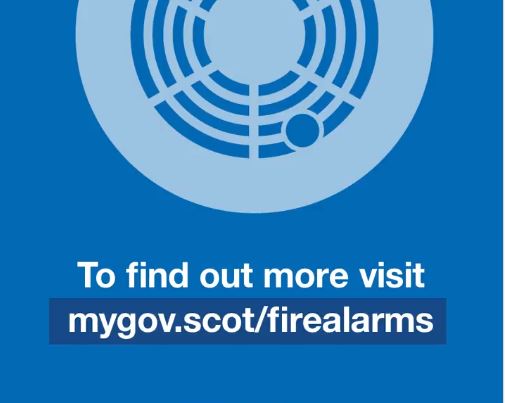Covid
The Omicron variant is still infecting people in Scotland, UK and across globe, but there is evidence that data is beginning to improve. Therefore, the Covid-19 Government restrictions which were put in place over the festive period have now been lifted, meaning nightclubs can reopen and there is no limit on attendance to events.
Wearing face coverings in indoor and public settings is still required, and the Covid certificate scheme is still in place for venues and events where the risk of spreading the virus is higher. There is ongoing serious consideration being given to extend the certificate scheme to all hospitality premises but due to a drop in cases the scheme was not extended. However, data will continue to be monitored.
The best way to combat the disastrous effects of the virus remains getting your full 3 doses of the Covid-19 vaccine – you can visit your local drop-in centre or book an appointment online.
In Parliament
New Smoke and Heat Alarm Regulations
The Scottish Government has improved the current fire alarm regulations to encourage everyone to have interlinked fire alarms. This will help protect lives and properties.
Social Justice, Housing and Local Government Minister, Shona Robison, addressed rising concerns about the new law and clarified the details of what is required and expected. She made it clear that non-compliance with the law does not automatically invalidate your home insurance and will not lead to a household being criminalised. It is recognised that many households will have delays to installing these alarms due to Covid-19, resource pressures, and inflated prices. This is completely acceptable. Any concerns about invalidating home insurance should be brought up directly with the insurance provider because they will clarify the terms and conditions of their policy.
There is also support available for those who require financial and practical assistance with installing the alarms. The Government has provided £1.5million to support vulnerable and high-risk individuals through the Fire Service and the Council’s Care and Repair scheme. Individuals should contact their local fire station and the Council to find out if they are eligible for support.

Making Scotland Greener, Fairer and Healthier
As part of the Scottish Parliament’s commitment to the Climate Change Plan Update, the Scottish Government has published its route map outlining steps needed to reduce car kilometres travelled by 20% by the year 2030.
The route map sets out a range of sustainable travel behaviours grouped into four categories:
- travel less: use online options where appropriate
- stay local: chose a more local destination to meet your needs
- switch mode: to walk, wheel, cycle, or use public transport where possible
- combine a journey: where the other options are not feasible
The route map has been developed by the Scottish Government and the Convention of Scottish Local Authorities (COSLA) and will now be the subject of a 12-week public consultation.
Help for Unpaid Carers
The Scottish Government have always been committed to improving carers’ rights and providing them with the support and extra help they deserve. Therefore, the £4 million funding package will help provide support to unpaid carers in recognition of the enormous role they play in looking after loved ones, and the added pressure many have faced during the pandemic.
Over the next few weeks, the additional winter funding will allow organisations working with unpaid carers to expand the services they provide to all groups of adult and young carers, including those looking after disabled children and young people and those caring for a friend or relative with dementia.
Increasing Mental Health Support in GP Practices
More mental health and wellbeing services will be provided within GP practices and community settings, thanks to significant Scottish Government investment of up to £40 million a year.
Under the new system, patients who need mental health support will be able to access a range of professional support through their doctor’s surgery rather than having to rely solely on their GP for a referral elsewhere. Examples of this support could include mental health nurses, psychologists, peer support workers, occupational therapists, and link workers.
Mental ill health is one of the major public health challenges and has been exacerbated by the pandemic which is why it has remained at the core of the Scottish Government’s recovery from Covid-19.
In the Constituency
- In January I continued with my virtual surgeries on a Friday. In February I intend to reopen in-person surgeries and visit some local organisations, however I will still make virtual appointments available to those who prefer this.
- I am delighted to see the development of the Threehills Larder in Pollok. They have established a ‘Pop-Up’ larder ahead of the opening of their main Community Supermarket in Nitshill. The Pop-Up Larder is next door to Southside Daycare on Woodhead Road, G53 7NN. You can sign up to their membership for free and keep up to date with their activities on social media and their website.
- I highlighted on my social media platforms that there is now free bus travel available for those aged 5-21 years old. Eligible people can now apply for their new or replacement National Entitlement Card (NEC) / Young Scot NEC on the Transport Scotland website. This initiative will help with the financial challenges faced by young people as well as encouraging more sustainable travel habits from an early age – a vital step to help Scotland reach its ambitious net-zero-by-2045 target.
- I welcomed the news of a new app which directs people to local access to free period products. The ‘PickupMyPeriod’ app allows users to identify locations across Scotland where period products can be accessed for free. There are currently over 700 venues linked to the app with the number expected to grow where further local authorities join. I am very proud that Scotland is the first country in the world to make period products widely available for free – firstly in education settings followed by wider community access.

